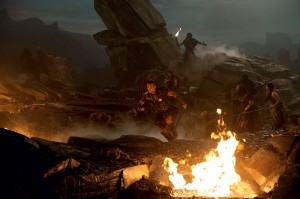

Early on in the film and preparing for the ponderous journey to save a city/defy the gods/behead the blah monster/kill time before the CG finale Sam Worthington’s Perseus is digging around in an armoury to tool up.
He opens a chest and pulls out this little fellow…


Clash of the Titans is a mess, and the faults lie at multiple pairs of feet. Louis Leterrier’s directorial missteps compound and elongate a frighteningly disjointed narrative and as a consequence the film suffers from the fluidity and grace of a trampolining hippo high on LSD.
Hacked up and pasted back together by an editor clearly working in the dark, we follow Perseus, an Australian demigod played by man of the moment Sam Worthington, whose promise seems be falling away under a gush of CGI, as his adopted family are crushed by Hades (Ralph Fiennes evoking an elderly banshee who smokes 80 a day) and gets caught up in a war between humans and their Gods.
Liam Neeson as Zeus was a great casting choice, however giving him virtually nothing to do and making him take direction from a broken moral compass, didn’t enable him to best his counterpart in the 1980 version, Laurence Olivier. CGing in a glossy shine to his armour made his appearance redolent of a 1970s Cylon and what dialogue he and Fiennes have together should be trembling with import but instead reduces their scenes to narrative kick starts and artless exposition.
It’s clumsy and cynical at every turn, at the end there is the most blatant sequel setup as I’ve ever seen and nothing about this film compels me to see more. I love a good fantasy film as much as the next person, but when some of the greatest stories ever told are reduced to a diluted mixture of 300, The Mummy and Braveheart, with outsized CGI scorpions driven by ill-judged comedy sidekicks it creates a suffocating blandness which drags down each actor and special effects artist with it.
Reshoots and 3D post production simply could not save this film. Even more so than Alice in Wonderland the 3D effect is so jarring that at times it seems as if several scenes were shot with body doubles wearing flat face masks of the actors. I have no problem with 3D at all, when done well it can add something very special to a film, but to shoehorn in a third dimension and to have this effect actively distract from the story playing out is a mistake. If you are to see it I highly recommend the 2D version.
Special mention needs to be made of the CGI in this film, as the trailers were very keen to play up the Kraken’s release, but the general whitewash of CG doesn’t get any better than shots we’ve seen a hundred times since the Lord of the Rings trilogy and The Mummy films. Harryhausen fans will bemoan Leterrier for his choices here, the Kraken’s design is prosaic and when you’re smashing seven shades of Shinola out of the city of Argos it is very hard to care about the people Perseus is trying to save, people to whom he has no connection.
His motives are clouded with badly orchestrated plotting, and worse dialogue; if you are to offer us a hero, he needs to be heroic. Sam Worthington tries his best, but like Mads Mikkelsen and A Single Man’s Nicholas Hoult he barely permeates the scenes, merely leaping, swinging his sword and mumbling about defiance and destiny, learning nothing, conveying no emotion, throwing out nothing to the audience and giving us no reason to care.

The script is the underlying issue with many of the film’s problems and it has the worse case of the Expositions I’ve seen for a long time. Words are spoken to literally describe what is happening on screen, giving us no credit at all and, worse still, smothers us into passivity while the noise and thunder blows on screen and we wait for the cast to explain what is going on. Gemma Arterton’s Io is the worse case of this, and seems present only to glue one scene onto another; each and every one of the actors on screen are capable of such better things.
I hate writing reviews like this, I was hoping for a classic tale of brave defiance in the face of the Gods, and I would have settled for a competent one. Instead nothing here works, with the heroes and villains drawn with little nuance and humanity, there is no sense of consequence to anything that happens, merely hopping from one scene to another. The Medusa section drew comparisons with The Scorpion King’s fight in the second Mummy film (and an earlier death scene is a virtual replica of one in The Mummy Returns as well), but unlike the 1980’s version of the film nothing about the Gorgon is scary, and that’s a fatal flaw for the whole scene.
Clash of the Titans is borne out of some of the most enduring myths and legends in our history, capable of being retold over and over in thrilling fashion as most of the elements are universal and timeless. This version of the myth has none of these elements and cannot come across as anything other than a disappointment.








